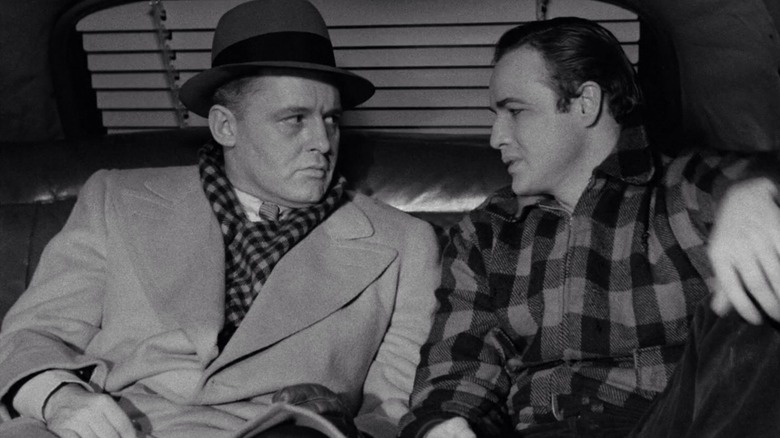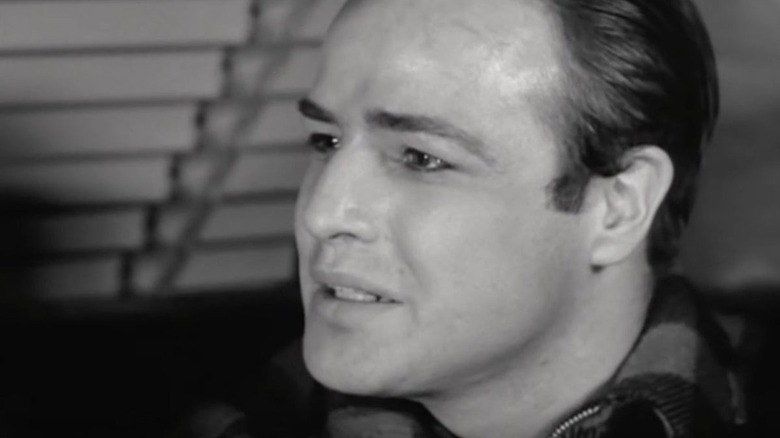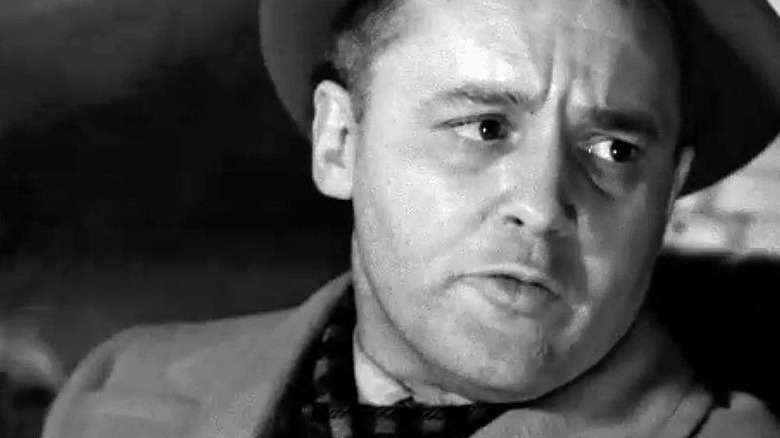Marlon Brando Left Rod Steiger High And Dry For On The Waterfront's Most Famous Scene
Elia Kazan's 1954 film "On the Waterfront" is a harrowing drama about corrupt dockworkers unions, the easy proliferation of crime in the American postwar workplace, and the washed-out hopefuls a corrupt system needs to survive. The film ultimately comes down to a decision: Testify in court against the corrupt organization that is exploiting working, garnering wages, and occasionally murdering the ones who threaten to put a stop to it ... or keep the criminal code of silence, continue to let the system proliferate, and ensure your survival. The film ultimately falls on the side of the American working class stiff who has become strangled by the corruption that holds him in place. Not just an exciting crime movie, "On the Waterfront" is a pointed indictment of the post-War economy, showing that all systems bend toward corruption.
This theme is particularly ironic, given what is known about Kazan. During the era of McCarthyism, Kazan was called to testify by the House Un-American Activities Committee. Rather than refuse testimony or condemn the idiocy of the court, Kazan named names, causing many to lose their careers. Kazan was safe. His peers were not. There's a reason many refused to stand and applaud when Kazan received his Honorary Oscar decades later. One might have implored Kazan to watch "On the Waterfront" and really listen to its messages about solidarity in the face of corruption.
The centerpiece of "On the Waterfront" is a scene in the back of a cab between the lead character Terry (Marlon Brando) and his criminal brother Charley (Rod Steiger). In it, Charley implores Terry, at gunpoint, to take a cushy job and keep quiet about corruption. Terry kind of snaps and laments his life. He coulda been a contender.
Steiger's memories of the scene aren't so rosy.
Insults as aid
In a 2000 on-camera interview with Scene by Scene, now available on YouTube via Eyes On Cinema, Steiger reminisced about working on "On the Waterfront," particularly the famous cab scene. Steiger revealed a strange technique that he used to aid his co-star. In order to keep tension in the scene high, Steiger claimed that some off-camera overacting — as well as some well-placed insults — can help a co-star. This is what Steiger did with Brando. He said:
"[N]obody knows what really goes on in a scene ... [W]e did Brando's close-up, and I was off-camera. When you're off-camera working with another actor, you do your nut. You overdo it to help them with reaction. And in that scene, you might say 'I gotta tell you something, I hate your guts. Do you understand? I hate you.' Off-camera, to help the actor, 'You're no good, you're a stupid. You couldn't act if your life depended on it, how did you get in this film?' You know, like that."
While this may seem cruel, given the tone of the scene, one might understand Steiger's technique. Charley is trying to shake down Terry, to intimidate him. There is a power dynamic in the scene that leaves Charley with the upper hand. Terry, meanwhile, hits rock bottom in the scene. He gives into a wave of wistful self-pity. He knows he could have been better than a mod-connected dock worker — he could have had class — and regrets his stolen life. Steiger seemingly understood the tone of the scene, and berated Brando to help him out.
Brando, however, was unwilling to return the favor.
Acting is reacting
The cab scene was shot with a few wide angles with both actors, then played two additional times with close-ups on Brando and on Steiger. Steiger, as stated above, was present for Brando's close-ups. Brando, however, left as soon as his scenes were done. Steiger, expecting to have his co-star to converse with and respond to, was left alone. One of Brando's claims to fame was popularizing the Method among a generation of young actors in the 1950s, so one might expect him to stay in the moment, to remain in character. Brando did not. He left the set entirely. Steiger was less than pleased:
"Acting is reacting, so we're very dependent on each other. And that son of a gun went home when it was time for my close-up. And I never forgot that. It was like a wounding. I couldn't believe a man that talented would walk out ... Oh, it's the lowest! And I had to do my close-up with the stage manager, sitting with his script saying [mumbling to imitate Brando]. So it must have burned his rear end we came out even in that scene."
Steiger was professional enough to play the scene, despite sitting next to a stage manager. The completed scene remains a highlight in one of the better of post-War American films. Some wounds were inflicted, but the scene emerged unscathed. Steiger clearly held something of a grudge, as he was still hurt as late as 2000. Brando, meanwhile, didn't go on record about Steiger.
Rod Steiger passed in 2002. Marlon Brando passed in 2004. One hopes they reconciled.


